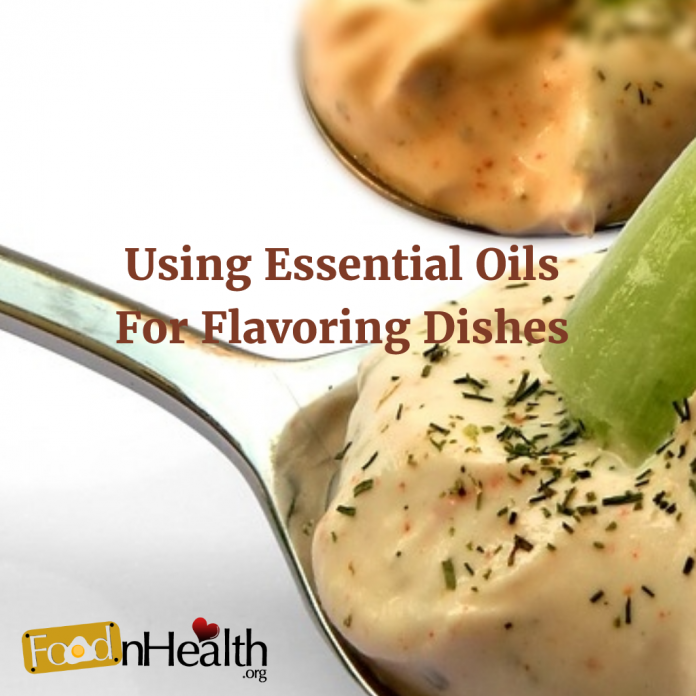Essential oils are becoming more common in our day to day life.
An essential oil is a concentrated liquid that is derived from the stem, leaves, or roots of a plant. They often have a delightful smell that can add fragrance to the air in your home or the water in your bath.
Many essential oils even have health benefits like soothing a cold or relieving muscle pains, but did you know that essential oils can also be used for flavoring your food?
Are They Safe to Ingest?
If you are considering cooking with essential oils, you need to make sure that you purchase oils that are 100 percent natural.
They also need to say that they are “Food Grade” because some of the cheaper essential oils that are not pure may contain perfumes to intensify their scents, which would not be safe to ingest.
You also want to avoid essential oils that say that they are “nature identical” because that means that they are made from synthetic ingredients that are designed to imitate the scent of the actual oil from the plant. Ingesting these chemicals can have negative effects on your body.
For example, horseradish is in a lot of things that we eat, but the essential oil contains an irritant that should not be ingested called allyl isothiocyanate.
Also, there are some natural oils from plants that are better for you in the form of essential oils. The reason for this is that some plants have toxic components in them, and the process of extracting the oil from the plant removes the threat from the essential oil completely, making it safe to ingest.
Be aware, however, that an essential oil that is safe for one person to consume may not be safe for someone else, especially if that person is having difficulties with their health. For example black pepper, rosemary, peppermint, and a few other essential oils can be dangerous for someone who has high blood pressure.
How to Properly Use Essential Oils in Food
Don’t forget that essential oils are concentrated, so you shouldn’t use the same amount of essential oils in a recipe as you would if you were using the actual herb. The quantity will be much lower; in fact, in most situations, you will only use a few drops.
Furthermore, most essential oils cannot be consumed unless they are diluted. If your recipe calls for olive oil or coconut oil, try diluting the essential oil in these ingredients instead of water so that it blends better.
Finally, you will need to add the essential oils into the food that you are cooking at the last minute because the oils will dissipate during the heating process. If you are baking, you will lose the flavor and some of the other properties of the essential oil that you are using somewhat, but it will still enhance the flavor of your dish significantly.
Essential Oils that are Safe
There are quite a few essential oils that are safe to consume, so if you want to add a little bit of orange essential oil to your chicken or some thyme essential oil to a stew, you can do so without worrying.
Let’s take a look at a few essential oils that you can try.
- Citrus: Whether you want lemon, orange, or another citrus flavor in your dish, essential oils are great for adding this type of flavor. This type of essential oil is pressed directly from the peel of the fruit, which means that it is going to be extra sensitive if heat is applied to it. That being said, it is great for drinks and sweet treats; just be careful not to keep it on the heat too long.
- Cinnamon: Cinnamon essential oil is very strong, which makes it perfect for baking. It will lose some of its potency, which will make it ideal for when you decide to make some cinnamon rolls. That being said, don’t forget to dilute it before adding it to your food.
- Ginger: Ginger is great for settling digestive issues that you may have, especially if you add the extract to a warm spiced drink that you are creating. It is also a great addition for desserts and stir-fries as well.
- Thyme: In many situations, you add thyme to stews and soups; but when you don’t have fresh herbs on hand, a few drops of thyme essential oil will work great. It is also a great essential oil to use if you want to boost your immune system a bit.
- Peppermint: A drop of peppermint can add a lot to any dessert or drink. You can even add a few drops of peppermint to some sweet chocolate dishes if you’d like. Peppermint is great for stimulation energy, so if you are feeling lethargic, some peppermint essential oil may put some pep in your step.
- Lavender: If you like a floral taste, then adding a few drops of lavender essential oil to some lemonade is ideal. Lavender is a relaxing and calming essential oil that is a great for a lot of savory dishes as well.
Recipe to Try: Frozen Peppermint Mocha Coffee Drink
If you have never cooked with essential oils before, it ‘s nice to start off simple.
A frozen drink will give you the flavor that you crave without the risk of the dissipation that you will experience with a more savory dish.
This blended drink is three cups of coffee, one cup of milk, two bananas, four tablespoons of cocoa powder (unsweetened), two drops of peppermint essential oil, and three dozen ice cubes. This recipe will yield two drinks.
Here’s another for you to try: Lavender Pound Cake with Lemon Glaze
Bottom Line
Essential oils are perfect for adding flavor and fragrance to your food, but you need to be careful with the amount that you use as well as the variety.
Always remember to dilute your essential oils, and if you want to experiment with a new flavor, using essential oils in drinks is a great place to begin.























